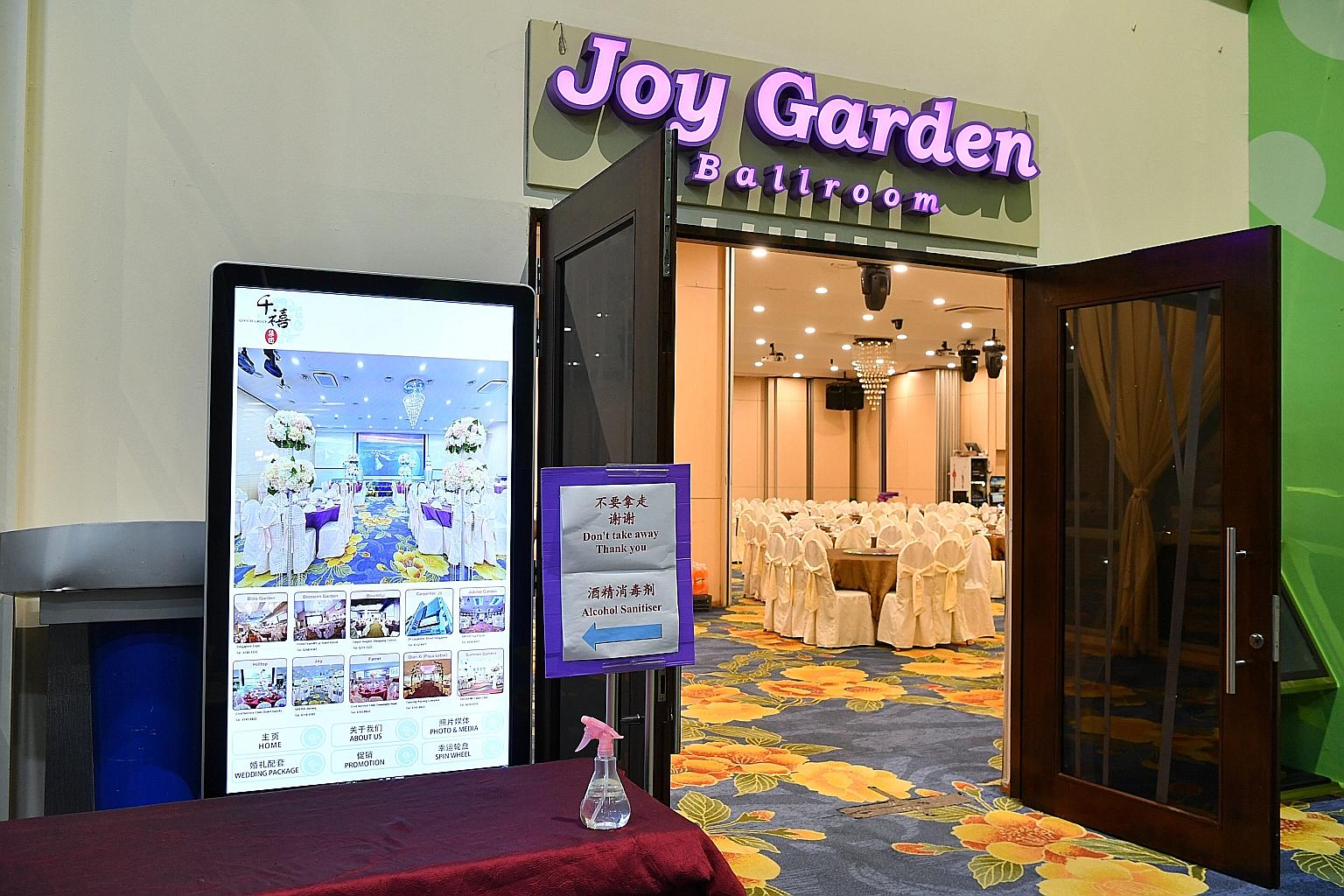Coronavirus outbreak: ST panel discussion
Coronavirus: Patients in Safra Jurong cluster had more than just a dinner in common
Sign up now: Get ST's newsletters delivered to your inbox

Of the 160 confirmed coronavirus cases in Singapore, 36 can be traced to a Feb 15 Chinese New Year function held in the ballroom of Joy Garden restaurant at Safra Jurong.
ST PHOTO: CHONG JUN LIANG
Singapore's biggest cluster of Covid-19 patients, traced to a restaurant in Jurong, had more than just a dinner in common, said Ministry of Health director of medical services Kenneth Mak yesterday.
"We've recognised that many of the individuals linked to this particular group of people getting infected had many common social activities," said Associate Professor Mak, pointing to other gatherings such as singing classes that infected individuals had taken part in together.
"So, in fact, their social interactions went well beyond the dinner in that particular location, and as a result of those close activities... that's where the spread is actually occurring," he said.
Prof Mak was responding to questions from The Straits Times' senior health correspondent Salma Khalik on Singapore's largest cluster of Covid-19 patients, during an hour-long panel discussion yesterday that was broadcast on the newspaper's social media channels.
Of the 160 confirmed coronavirus cases in Singapore, 36 can be traced to a Feb 15 Chinese New Year celebration at Safra Jurong, making it the nation's largest cluster.
The function, attended by members of a Hokkien singing group, was held in the ballroom of Joy Garden restaurant.
Prof Mak said it was unfortunate that it had been named the "Safra cluster", noting: "It just so happened that the dinner was held there."
Nonetheless, it was the event that led to this cluster being recognised and identified, he said.
Prof Mak said that while it was likely that some patients had been infected during the dinner, epidemiological and contact tracing found that others could have caught the disease when they gathered for other social activities.
He said: "So, it extends well beyond that particular dinner itself - they're coming together for karaoke classes, they're going out together, they're going on social activities together. So, that seems to be the common pattern with this particular cluster."
Further investigations by the contact tracing team were under way, he said, and more people might be contacted to check if they are well.
The virus causing Covid-19 is now thought to spread mainly through respiratory droplets. Patients can, for instance, catch the disease by being exposed to an infected person's cough.
But as Professor Leo Yee Sin, executive director of the National Centre for Infectious Diseases, said yesterday, viruses can be transmitted through direct or indirect droplet transmission, and that the two are not mutually exclusive.
For example, individuals who spend time together in close proximity would be exposed to the same surfaces.
Prof Mak explained: "It's more likely in that sort of setting that if you had been coughing or sneezing... you (would have) touched surfaces. And it's likely that in that setting, I would have touched (the same) surfaces as well. So, from that point of view, it's hard to tell whether one particular mode is more important."
Prof Leo and Prof Mak were two of four experts who took part in yesterday's panel discussion.
The others were Professor Tikki Pangestu, a visiting professor at the Lee Kuan Yew School of Public Policy and former director of the World Health Organisation's research policy and cooperation department, and Associate Professor Hsu Li Yang, infectious diseases programme leader at the National University of Singapore's Saw Swee Hock School of Public Health.
The experts emphasised the importance of personal hygiene in combating the spread of the disease.
Said Prof Leo: "If you are not feeling well, remove yourself, isolate yourself, seek treatment."


